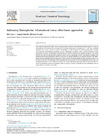Addressing Chemophobia: Informational versus affect-based approaches
dc.contributor.author
Saleh, Rita
dc.contributor.author
Bearth, Angela
dc.contributor.author
Siegrist, Michael
dc.date.accessioned
2020-05-13T09:19:30Z
dc.date.available
2020-05-12T03:29:28Z
dc.date.available
2020-05-13T09:19:30Z
dc.date.issued
2020-06
dc.identifier.issn
0278-6915
dc.identifier.issn
1873-6351
dc.identifier.other
10.1016/j.fct.2020.111390
en_US
dc.identifier.uri
http://hdl.handle.net/20.500.11850/414379
dc.identifier.doi
10.3929/ethz-b-000414379
dc.description.abstract
This study investigated the effect of two communication strategies (informational and affect-based) in reducing chemophobia, the irrational fear of chemicals. In an online experiment, participants (N = 448) were randomly assigned to one of three groups (“control”, “knowledge”, or “affect” group). The following dependent variables were assessed: chemophobia, knowledge of basic toxicological principles, affect towards chemicals, benefit perception of the use of chemicals, and preference for natural substitutes in consumer products. The results showed that only the informational approach, which conveys knowledge of basic toxicological principles, significantly decreased chemophobia and the preference for natural substitutes in consumer products. The affect-based approach significantly increased positive affect towards chemicals and the benefit perception of their use, but did not decrease chemophobia. This suggested that the provision of relevant information about basic toxicological principles is a more effective strategy than merely addressing laypeople's affect towards chemicals to reduce chemophobia. Relevant knowledge could be taught in schools or disseminated by toxicologists and scientists who are trusted by the public.
en_US
dc.format
application/pdf
en_US
dc.language.iso
en
en_US
dc.publisher
Elsevier
en_US
dc.rights.uri
http://creativecommons.org/licenses/by-nc-nd/4.0/
dc.subject
Chemophobia
en_US
dc.subject
Knowledge
en_US
dc.subject
Affect
en_US
dc.subject
Toxicology
en_US
dc.subject
Risk perception
en_US
dc.subject
Risk communication
en_US
dc.title
Addressing Chemophobia: Informational versus affect-based approaches
en_US
dc.type
Journal Article
dc.rights.license
Creative Commons Attribution-NonCommercial-NoDerivatives 4.0 International
dc.date.published
2020-04-26
ethz.journal.title
Food and Chemical Toxicology
ethz.journal.volume
140
en_US
ethz.journal.abbreviated
Food Chem. Toxicol.
ethz.pages.start
111390
en_US
ethz.size
9 p.
en_US
ethz.version.deposit
publishedVersion
en_US
ethz.identifier.wos
ethz.identifier.scopus
ethz.publication.place
Amsterdam
en_US
ethz.publication.status
published
en_US
ethz.leitzahl
ETH Zürich::00002 - ETH Zürich::00012 - Lehre und Forschung::00007 - Departemente::02070 - Dep. Gesundheitswiss. und Technologie / Dep. of Health Sciences and Technology::03780 - Siegrist, Michael / Siegrist, Michael
ethz.leitzahl.certified
ETH Zürich::00002 - ETH Zürich::00012 - Lehre und Forschung::00007 - Departemente::02070 - Dep. Gesundheitswiss. und Technologie / Dep. of Health Sciences and Technology::03780 - Siegrist, Michael / Siegrist, Michael
ethz.date.deposited
2020-05-12T03:29:35Z
ethz.source
SCOPUS
ethz.eth
yes
en_US
ethz.availability
Open access
en_US
ethz.rosetta.installDate
2020-05-13T09:19:44Z
ethz.rosetta.lastUpdated
2021-02-15T10:59:58Z
ethz.rosetta.versionExported
true
ethz.COinS
ctx_ver=Z39.88-2004&rft_val_fmt=info:ofi/fmt:kev:mtx:journal&rft.atitle=Addressing%20Chemophobia:%20Informational%20versus%20affect-based%20approaches&rft.jtitle=Food%20and%20Chemical%20Toxicology&rft.date=2020-06&rft.volume=140&rft.spage=111390&rft.issn=0278-6915&1873-6351&rft.au=Saleh,%20Rita&Bearth,%20Angela&Siegrist,%20Michael&rft.genre=article&rft_id=info:doi/10.1016/j.fct.2020.111390&
Dateien zu diesem Eintrag
Publikationstyp
-
Journal Article [129263]

